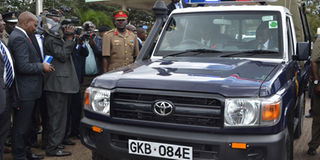To lease or to buy? Police are 1,000 vehicles better off

PHOTO | JEFF ANGOTE President Uhuru Kenyatta (seated at the drivers seat) and his Deputy William Ruto (right) test-drive one of the newly leased police vehicles at Uhuru Park on November 7, 2013. The more than 1000 police vehicles flagged-off by the president will help the police enhance service delivery to the citizens.
What you need to know:
- Deputy President William Ruto defended the lease, arguing that many police vehicles are grounded because of minor mechanical faults, and this had cost the country millions of shillings.
- The Sunday Nation has established that at least three of the vehicles are grounded for lack of spare parts.
The lease of 1,000 police vehicles has stirred debate on whether the acquisition was not more costly than purchase.
This is the first time any administration has acquired more than 1,000 cars for a single government department at a go.
The vehicles will be sent to police stations across the country to enhance security. Toyota Kenya won the tender to lease the 1,100 vehicles.
In addition, the government has set aside Sh4 billion for the procurement of modern security equipment each year for the next five years, Sh4.5 billion for security work and Sh1.5 billion for crime research and investigation.
But it is the leasing of the vehicles that is being discussed.
Deputy President William Ruto defended the lease, arguing that many police vehicles are grounded because of minor mechanical faults, and this had cost the country millions of shillings.
“We want the police to do what they are trained to do — provide security. Minor issues like repairing vehicles should not bog them down,” he said.
According to the Deputy President, this option eliminates the headaches associated with ownership and maintenance of vehicles, allowing police to concentrate on their core duty.
Mungai Kihanya, a Sunday Nation columnist (World of Figures) and personal and corporate management trainer, argues that leasing was long overdue.
“Financially it doesn’t appear to make sense; however, from a management point of view it makes a lot of sense. Leasing is cheaper because you do not incur any fleet management costs. The only thing you incur is the fuel cost,” he told the Sunday Nation on the phone.
Mr Kihanya said those arguing against leasing are probably not seeing the bigger picture.
“It would probably cost the government another Sh3 billion a year to maintain 1,000 vehicles,” he says and explains: “The government would spend about Sh100,000 to repair a single vehicle that would cost an individual about Sh10,000 to repair because the government is a bad paymaster. Suppliers therefore overquote.”
Were they left to the government to maintain, most of the vehicles would be grounded as mintenance is both tedious and long, Mr Kihanya said. But with leasing there is no need for a garage as all the police will do is call Toyota Kenya to repair or replace a vehicle. That way security will not be jeopardised.
This is the reason many private companies prefer leasing to cash purchases. The government will also have money to do other things as leasing, unlike purchasing, leaves it with money since payment is not made at once.
“You might need nothing more to secure a lease than the first month’s payment and a security deposit, which is usually about one monthly payment,” said a National Treasury official who sought anonymity as he is not permitted to comment on official matters.
Last year, the government imported about 760 Cherry Tiggos, Chinese sports utility vehicles, for the Provincial Administration and the Police Department.
However, the Sunday Nation has established that at least three of the vehicles are grounded for lack of spare parts.
According to the lease agreement, Toyota Kenya will be responsible for servicing the vehicles and will also monitor their movement through geosensor network. There have been cases of senior officers using the vehicles for personal use. In the new arrangement, the vehicles will not leave their jurisdiction.
This will check the misuse of funds for vehicle maintenance.
For instance, Kilimani and Isiolo divisions get Sh1.2 million and Sh1.9 million for fuel and maintenance as a quarterly allocation. There have, however, been cases where the funds have been used for other purposes.





